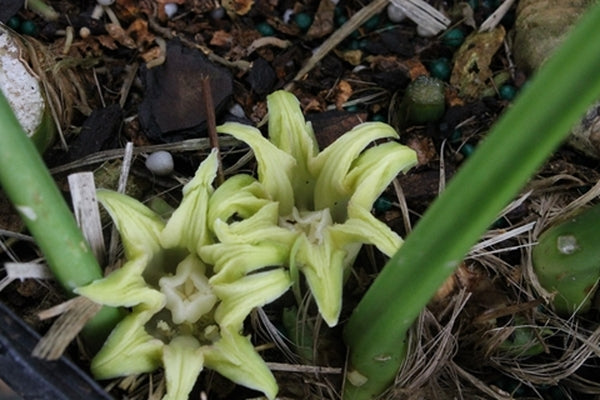Aspidistra attenuata 'Alishan Giant Splatter'
Alishan Giant Splatter Cast Iron Plant
Item #: 9914
Zones: 8a to 11, at least
Dormancy: Evergreen
Height: 38" tall
Origin: Taiwan
Pot Size: 3.5" pot (24 fl. oz/0.7 L)
To be alerted when this plant is back in stock, log in and add it to your wishlist. You will receive an email when it is available.
(aka: Aspidistra daibuensis A1TW-355c) Aspidistra attenuata 'Alishan Giant Splatter' is our tallest collection from Taiwan's Mt. Alishan, topping out with 38" tall x 3.5" wide green leaves that are moderately speckled gold. Aspidistra 'Alishan Giant Splatter' will be deciduous below 12 degrees F. The jester cap-shaped flowers that hover at ground level starting in early February (NC) are bright lemon yellow...very cool.
Maintenance:
Aspidistra are very low maintenance perennials. Each leaf can last up to 3 years, but after the second year, it will begin to show signs of aging and leaf degradation. For that reason, we recommend removing all old foliage regularly to retain the attractiveness of the clump. It's always disappointing to see large patches of cast iron plants in public spaces where it hasn't been properly maintained.
Growing Conditions:
Cast iron plants grow well in both moist and dry soils as long as the drainage is good. They must be grown in shade, since their foliage will scorch if they are subjected to sun. In the jungles where they grow, they are often seen in very deep shade.
In containers, they make superb house plants. The common name cast iron plant speaks to their durability in less than ideal conditions. Regular moisture, including increased humidity when they are grown as house plants, keeps them from getting stressed and becoming susceptible to spider mites.
Garden Value:
The bold texture and upright form of aspidistra plants is invaluable in the garden, since there few other plants with this form and texture. Many cast iron plants have amazing flowers, produced at the base of the foliage, often in the winter months. While these flowers are rarely noticed in the garden, they can be quite attractive in the home.



-
Other Attributes
Genus: Aspidistra
Flower Color: Multicolor , Violet
Leaf Color: Green , Variegated
Bloom Time: Winter
Container Role: Fillers , Thrillers
Other: Deer Resistant Plants , Drought Tolerant Plants , Dry Shade Plants , Pollinator Plants , Medicinal Plants , Plant Delights Introductions , Plants from China , Rabbit Resistant Plants , Salt Tolerant Seaside Plants , Tropical Looking Plants , Colored Foliage , Patterned Foliage , Plant Delights Creations and Discoveries , Plants Retiring This Year , House Plants





